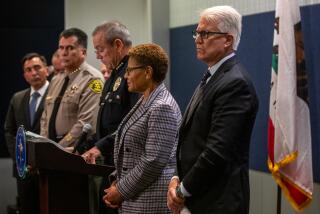Suspect in Grisly Slayings Held in Indonesia
- Share via
Los Angeles police got a break in a gruesome murder case, announcing Friday that authorities in Indonesia have arrested a suspect wanted in the slayings of two men and a woman whose decomposing bodies were discovered during the summer in a Northridge storage locker.
The suspect, Harnoko (Oki) Dewantono, 30, was arrested by Indonesian authorities in Jakarta, the country’s capital, said Lt. Al Moen, head of the Los Angeles Police Department’s Major Crimes Investigation Section.
Moen said authorities are working to return Dewantono to the United States to face triple murder charges in the deaths of Eri Tri Harto Darmawan, 26, Gina Sutan Aswar, 30, and Surish Michandani, 40, whose bodies were discovered Aug. 10. Police are trying to confirm a report by Dewantono’s mother, who lives in Jakarta, that Dewantono and Darmawan are brothers.
Los Angeles Detective Ted Ball, who is leading the investigation, said it remains unclear whether Dewantono will stand trial in Los Angeles because no extradition treaty exists between the United States and Indonesia. John Russell, a U.S. Justice Department spokesman, said his office is aware of the case, but would say only that it is possible to “work through diplomatic channels to effect an extradition” of individuals.
No motive has been released for the murders and no connection has been made among the victims, who police believe were killed at different times between 1991 and 1993, Ball said. All three victims--who had been living in Los Angeles--were badly beaten in the head, and Michandani had also been shot.
Police began making progress in the investigation last month after holding a news conference in Los Angeles identifying the victims and announcing that Dewantono had been charged with three counts of murder.
Word of the murders spread throughout the Indonesian community in Los Angeles and reports were carried widely in the Southeast Asian country, aiding police in their investigation, Ball said. “It’s a huge story there,” Ball said. “It’s the O.J. Simpson case of Indonesia.”
Sunten Manurung, a spokesman for the Indonesian Consulate in Los Angeles, agreed that the story was “a big headline in Indonesia.”
After news of the investigation was reported in Indonesian last month, Ball said he was informed by family members of the victims that Dewantono was in Jakarta. Ball said there may have been people who either knew Dewantono or the victims in Los Angeles but who had since returned to Indonesia.
Law enforcement authorities in Jakarta were alerted through Interpol and arrested Dewantono last Saturday at a relative’s home in Jakarta, according to Ball and Manurung.
Ball said he believes Dewantono returned to Indonesia in 1993 and that he has used numerous aliases and passports. He was last seen in the United States in February, 1993, living in an apartment in the Lake Forest area of Orange County.
Dewantono’s uncle and another brother are expected to arrive in Los Angeles from Jakarta next week to meet with police.
The victims were reported missing in 1991 and 1992. Darmawan and Aswar were Indonesians traveling on student visas. Michandani was from India, but had spent most of his life in Kuwait.
Investigators have said that Dewantono knew Aswar through business dealings related to financial investments and at one time may have been his roommate.
Dewantono is also believed to have sold Michandani a Woodland Hills dry-cleaning business, now closed.
The discovery of the bodies on a hot August day shocked San Fernando Valley residents. The remains were discovered by a storage room speculator who had purchased the contents of a storage room at a public auction after the owner failed to pay the rent. The buyer noticed a foul smell and found one body wrapped in plastic and duct tape. Later, police found two other bodies.
The bodies were so badly decayed that coroners needed a month to identify them. Medical examiners identified Darmawan by rehydrating his fingers to get fingerprints, and dental records were used to identify Aswar.
More to Read
Sign up for Essential California
The most important California stories and recommendations in your inbox every morning.
You may occasionally receive promotional content from the Los Angeles Times.












